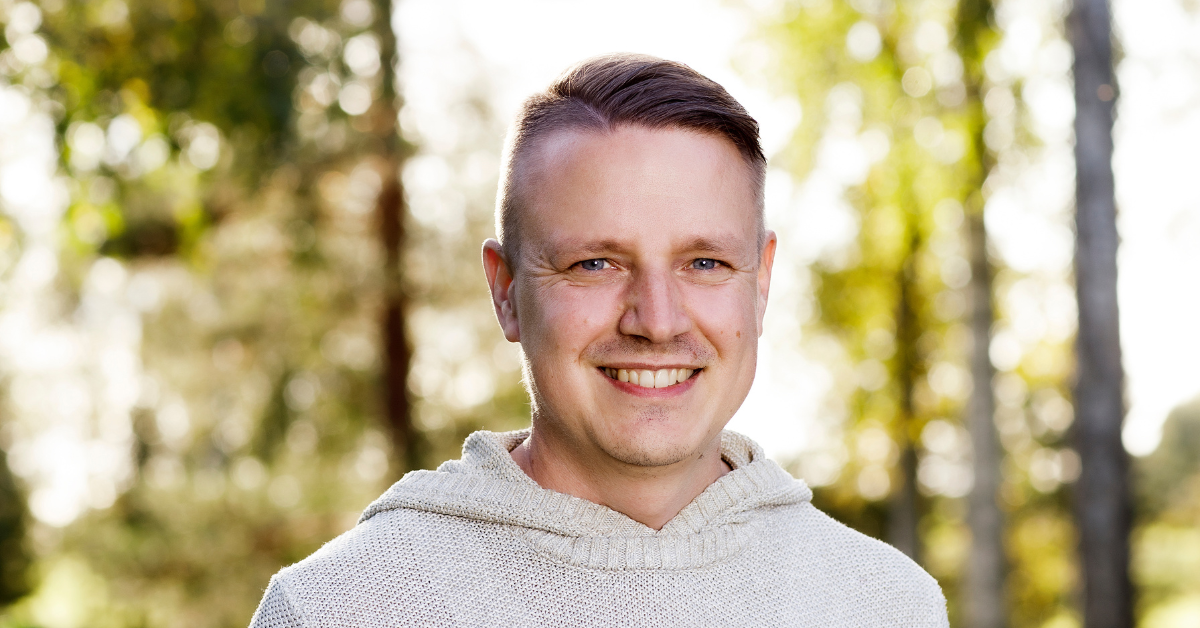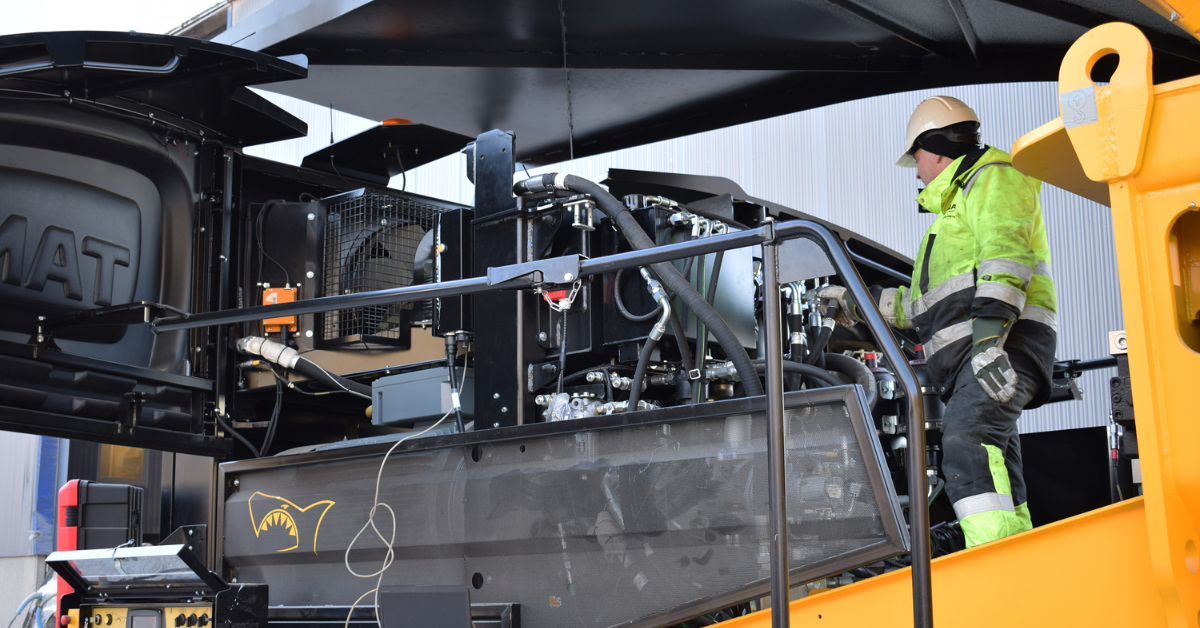Tana’s smart products are used for processing solid waste and recycling fractions. In our recruitment activities, we have begun to notice that the industry is starting to attract interest in a new way. Fresh faces in the company’s management recognise the appeal of sustainability.
“Sustainability supports the feeling that one’s work is meaningful, and the environment is the strongest driver behind that,” says Tana CEO Kalle Saarimaa.
“Our absolute trump card is the industry we operate in,” agrees Johanna Sajasalo, VP, People & Culture.
Environmental and climate issues have been highlighted in Tana’s operating environment for decades.
Tana’s waste compactors and shredders improve the processing of solid waste at landfills and processing centres around the world. They help reduce the surface area needed for waste management and shape the recyclable material into usable fractions. At the same time, they generate data that can be used to make waste processing even more efficient and lower emissions.
Tana has outsourced both its production and dealership network, so our own personnel is made up mostly of R&D, purchasing, and sales and marketing professionals. Other high-tech industrial companies are competing for the same highly skilled experts. That is the reason why themes related to people and culture have emerged even more strongly alongside traditional environmental issues.
“Job seekers appreciate that this is a very sustainable business,” says Johanna Sajasalo. “Here in Jyväskylä, people know us, even though we are a small employer. In addition to sustainability, internationality is a strength for us, as we are indeed a very international company.”
The number of personnel at Tana has increased especially over the past couple of years. The wellbeing and job satisfaction of Tana employees have been monitored for a long time, and feedback has also been taken into account when developing the company’s operations.

In his career, Kalle Saarimaa has promoted the circular economy on many fronts. He brings to Tana an even deeper understanding of the circular economy, recycling materials and engaging employees through meaningful work.
Tana is growing in the heart of the circular economy
Tana’s business continues to grow along with the circular economy. The limitation of natural resources and the need to improve the recycling and reuse of materials is increasingly recognised among different countries and companies.
“If we want to preserve our current welfare society, there is no other option but to modify the operating models to suit the circular economy,” says CEO Kalle Saarimaa. He points to the estimate that 73 percent of the Earth’s natural resources are already in use.
“If 93 percent of the material used every year ends up in landfills, storage or in the atmosphere, it is easy to calculate that we are starting to run out of materials. This also causes permanent damage to biodiversity,” Saarimaa emphasises.
From thoughts to actions
Saarimaa is known as a strong advocate of the circular economy. He has argued that it is no longer sufficient for companies to simply improve their products, streamline their business processes and reduce their impacts. These are all worthy goals, but they are not enough to make a circular economy company of the future.
“For a business to be sustainable and successful in the future as well, one has to ask what the company’s operating model and products would look like if it operated strictly in accordance with the principles of the circular economy,” Saarimaa explains.
“It is easy to think of ways to manufacture products more sustainably than before, while overlooking the raw materials used and the recyclability of the products. Should recycled steel and plastics be used? Or even remanufactured parts, and how can the product’s life cycle be extended? More thought should be given to entire chain.”

The competition for R&D and sales experts in technology is intensifying. “Our absolute trump card is the industry we operate in. Job seekers appreciate that this is a very sustainable business,” says Johanna Sajasalo, VP, People & Culture.
New thinking from the perspective of the market and customer needs
Kalle Saarimaa and Johanna Sajasalo still view the daily operations of Tana with fresh eyes after around half a year of experience. Saarimaa has also worked on the company’s board for a few years, so he is familiar with the challenges and opportunities of the business. Both professionals bring to Tana experience and vision that support our growth target.
Sajasalo has extensive experience in HR, having spent 10 years at Nokia and then 15 years at Landis+Gyr, a global leader in energy management solutions. Employer image, the product itself and social responsibility were all important factors in her previous positions as well. According to Sajasalo, she was even somewhat surprised by how much Tana had already focused on corporate sustainability.
“I have spoken a lot with Marketing Director Kirsi Ahonen, who is responsible for sustainability and communications. We both feel that we need to invest in these areas also in the future. It is important to discuss sustainability and even question it,” she states.
As Vice President responsible for People & Culture, Sajasalo is keen to encourage Tana personnel to think proactively about future needs, such as what materials should be used in our products and what power sources should be considered in their design.
“This will offer interesting new professional challenges for our experts,” she believes.
Tana’s CEO agrees. “We want to motivate our personnel to think in new ways. To think big, from the perspective of the changing market and customer needs – not so much in terms of our machines. We have good values and strong expertise to back this up,” Saarimaa says.

Tana’s advanced solutions promote a profitable circular economy and environmental health, save natural resources and improve land use. The company is recognised as a sustainable environmental technology leader.
A balancing act between the real world and ambition
In Tana’s organisation, both the marketing director and quality director are involved in developing sustainability. However, the ultimate responsibility lies with the CEO.
Having studied environmental technology during his studies, Kalle Saarimaa has promoted the circular economy on many fronts. He has experience in recycling and environmental management. Most recently he was Senior Vice President of Circular Solutions at Fortum. Already as Managing Director of Ekokem before then, he noticed how much work means to people.
“The level of commitment was quite different from my previous workplace in the packaging industry,” Saarimaa says.
Environmental issues were commonplace at Ekokem, but less attention was paid to sustainability in terms of people and governance. Awareness of these aspects of the environmental, social and governance (ESG) factors of sustainability had to be emphasised separately. At Tana, Saarimaa finds that employees do find their work meaningful. Moreover, the experience is still overshadowed by the lack of development in materials recycling.
“Our circular economy model is based on rebuilds. We take back end-of-life machines in order to refurbish and rebuild them. This significantly reduces our material and carbon footprint,” Saarimaa says.
Insights about the future
Saarimaa believes that this operating model, which is being developed through pilots, will expand in the future. He points out that sustainably produced steel, for example, is still not available on the market.
“In many cases, the circular economy demands that the supplier and the customer work together to innovate a solution,” he adds. In practice, implementing all the principles of the circular economy rapidly is not realistic. Nevertheless, already today, Tana’s machines are helping to improve the environment where they are used. “This is a balancing act between the real world and ambition. If recycling is more expensive than landfilling, it is unlikely to happen.”